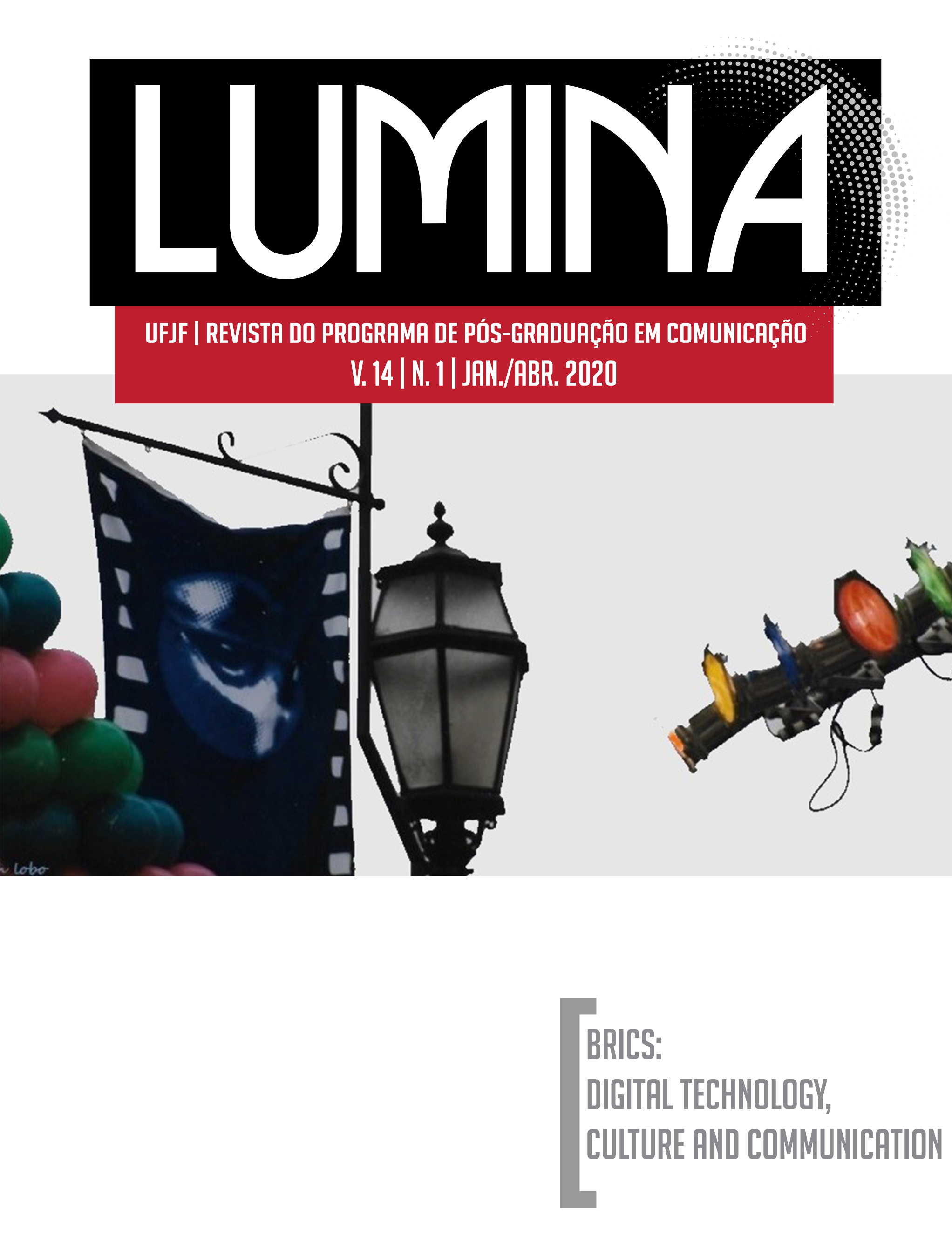The rupture in Hong Kong cinema: Post-2000 Hong Kong cinema(s) as both a transnational cinema and a national cinema
DOI:
https://doi.org/10.34019/1981-4070.2020.v14.30238Palavras-chave:
Hong Kong SAR New Wave, Film Industry, Transnational Cinemas, National Cinema, Hong Kong CinemaResumo
This paper traces artistic and ideological discrepancies between the young generation of Hong Kong filmmakers and their predecessors – the established generation who contributed to the glory days of Hong Kong cinema during its economic boom. By tracing studies of national cinema and transnational cinema in the last three decades, the author argues that current Hong Kong cinema has split into two: a transnational cinema represented by the established generation of filmmakers; and a national cinema that is driven by the emerging generation who struggles for better preservation of Hong Kong local culture and their own cultural identities. To conduct the research, 47 people were interviewed including13 established filmmakers, 16 young filmmakers and18 film students from 3 universities in Hong Kong. The three groups of respondents generally represent three perspectives: that of the established film practitioners, who have a vested interest in the current co-production era; that of the emerging young film practitioners, who above all crave a flourishing local film market and whose productions exhibit stronger Hong Kong cultural identities; lastly, that of the, who were predominantly born in the 1990s and have the most extreme views against mainland China and whose filmmaking ideologies and practices foreshadow the future of the industry.
Downloads
Referências
BERRY, C. What is transnational cinema? Thinking from the Chinese situation. Transnational Cinemas, v.1, n.2, p. 111-127, 2010. Disponível em: <https://bit.ly/2Ryk8Lp>. Acesso em:13 abr. 2020.
CHEUNG, C. Challenges of the film industry in Hong Kong. Legislative Council of the Hong Kong Special Administrative Region of the People’s Republic of China, Online, 2016. Acesso em: https://www.legco.gov.hk/research-publications/english/essentials-1516ise13-challenges-of-the-film-industry-in-hong-kong.htm>. Acesso em:13 abr. 2020.
CHU, F. To the young people: the brief history of Citizen Participation in Hong Kong. Inmediahk, Online, 2014. Disponível em: <http://www.inmediahk.net/20140906bb>. Acesso em: 13 abr. 2020.
CHU, Y. Hong Kong Cinema: Coloniser, Motherland and Self. Londres: Routledge, 2003.
Commerce and Economic Development Bureau. Assessment Report on Hong Kong’s Capacity to Receive Tourist, Online, 2013. Disponível em: <https://www.tourism.gov.hk/resources/english/paperreport_doc/misc/2014-01-17/Assessment_Report_eng.pdf>. Acesso em: 13 abr. 2020.
CROFTS, S. Reconceptualizing national cinema/s. Quarterly Review of Film and Video, v.14, n.3, p. 49-67, 1993. Disponível em: <https://bit.ly/2K17dNL>. Acesso em: 13 abr. 2020.
Federation of Hong Kong Filmmakers. Policy report on revitalizing Hong Kong's film industry, Online, 2012. Disponível em: <https://www.legco.gov.hk/yr02-03/chinese/panels/itb/papers/itb1203cb1-356-c.pdf>. Acesso em: 13 abr. 2020.
HIGSON, A. The Concept of National Cinema. Screen, v. 30, n.4, p. 36–46, 1989. Disponível em: < https://bit.ly/3ekX3Wj>. Acesso em: 13 abr. 2020.
HO, H. Wan’e zhiyuan? Danchengzheng de misi [Root of all evil? The myth of One-way Permit Scheme]. Inmediahk, Online, 2017. Disponível em: <https://www.inmediahk.net/node/1054063>. Acesso em: 13 abr. 2020.
KE, Y. Zhonggang maodun wei tingguo: Zengzhihao, Chen Jiaming beipi pianbang dalu [Hong Kong – Mainland China Conflict has ever stopped]. HK01, Online, 2017. Disponível em: <https://bit.ly/3cghq4U>. Acesso em: 13 abr. 2020.
LEE, V. Between colony and nation: Decolonial visions in Hong Kong independent cinema. New Cinemas: Journal of Contemporary Film, v. 11, n.1, p. 3-21, 2013. DOI: 10.1386/ncin.11.1.3_1
LI, C.T. Changes in Hong Kong society through cinema. Hong Kong: Urban Council,1988.
LU, S. Transnational Chinese cinemas identity, nationhood, gender. Honolulu: University of Hawaii Press, 1997.
MING, P. Gang wujia yazhou dier: quanqiu paiming die liangji [The living cost of Hong Kong ranked number 2 in Asia, world ranking dropped 2 places], Online, 2018. Disponível em: <https://www.mpfinance.com/fin/daily2.php?node=1521138028218&issue=20180316>. Acesso em: 13 abr. 2020.
NGO, H.; LI, H.; FONG, E.; VERKUYTEN, M.; CHOI, S. Cultural Identity and Adaptation of Mainland Chinese Immigrants in Hong Kong. American Behavioral Scientist, v. 60, n. 5-6, p. 730-749, 2016. Disponível em: <https://bit.ly/2ya46jS>. Acesso em: 13 abr. 2020.
POPULATION BY-CENSUS. Snapshot of Hong Kong Population, Online, 2016. Disponível em: <https://www.bycensus2016.gov.hk/en/bc-snapshot.html>. Acesso em: 13 abr. 2020.
SUN, N. Hong Kong to see flat growth in mainland China tourist numbers for next five years. Hong Kong Economy. South China Morning Post, Online, 2016. Disponível em: <https://www.scmp.com/news/hong-kong/economy/article/1902829/hong-kong-see-flat-growth-mainland-china-tourist-numbers-next>. Acesso em: 13 abr. 2020.
SZETO, M.M. ; CHEN, Y.C. Hong Kong Cinema in the Age of Neoliberalization and Mainlandization: Hong Kong SAR New Wave as a Cinema of Anxiety. In CHEUNG, M.K.; MARCHETTI, G. & YAU. C.M. (orgs). A companion to Hong Kong cinema (Wiley-Blackwell companions to national cinemas). Malden: Wiley Blackwell, 2015
SZETO, M,; CHEN. Mainlandization or Sinophone translocality? Challenges for Hong Kong SAR New Wave cinema. Journal of Chinese Cinemas, v. 6, n. 2, p. 115-134, 2012. Disponível em: < https://bit.ly/3etfEzw>. Acesso em: 13 abr. 2020.
TEO, S. Local and Global Identity: Whither Hong Kong Cinema. In CHEUNG, M.K.; CHU, Y. (orgs.) Between home and world: A reader in Hong Kong cinema. Hong Kong: Oxford University Press, 2014. p.100-110.
ZHANG, Y. Chinese national cinema (National cinemas series). Nova York: Routledge, 2004.
Downloads
Publicado
Como Citar
Edição
Seção
Licença
Autores que publicam nesta revista concordam com os seguintes termos:
- Autores mantém os direitos autorais e concedem à revista o direito de primeira publicação, com o trabalho simultaneamente licenciado sob a Licença Creative Commons Attribution que permite o compartilhamento do trabalho com reconhecimento da autoria e publicação inicial nesta revista.
- Autores têm autorização para assumir contratos adicionais separadamente, para distribuição não-exclusiva da versão do trabalho publicada nesta revista (ex.: publicar em repositório institucional ou como capítulo de livro), com reconhecimento de autoria e publicação inicial nesta revista.
- Autores têm permissão e são estimulados a publicar e distribuir seu trabalho online (ex.: em repositórios institucionais ou na sua página pessoal) a qualquer ponto antes ou durante o processo editorial, já que isso pode gerar alterações produtivas, bem como aumentar o impacto e a citação do trabalho publicado (Veja O Efeito do Acesso Livre).








